Neighborhood of Brooklyn in New York City
| Borough Park | |
|---|---|
| Neighborhood of Brooklyn | |
 Temple Beth El of Borough Park Temple Beth El of Borough Park | |
| Location in New York City | |
| Coordinates: 40°38′02″N 73°59′35″W / 40.634°N 73.993°W / 40.634; -73.993 | |
| Country | |
| State | |
| City | New York City |
| Borough | Brooklyn |
| Community District | Brooklyn 12 |
| Languages | List |
| Area | |
| • Total | 2.071 sq mi (5.36 km) |
| Population | |
| • Total | 153,470 |
| • Density | 74,000/sq mi (29,000/km) |
| Ethnicity | |
| • White | 77.0% |
| • Asian | 11.7% |
| • Hispanic (of any race) | 9.4% |
| • Black | 0.7% |
| • Other | 1.2% |
| Economics | |
| • Median household income | $37,438 |
| Time zone | UTC−5 (Eastern) |
| • Summer (DST) | UTC−4 (EDT) |
| ZIP Codes | 11204, 11218–11220 |
| Area code | 718, 347, 929, and 917 |
Borough Park (also spelled Boro Park) is a neighborhood in the southwestern part of the borough of Brooklyn, in New York City. The neighborhood is bordered by Bensonhurst to the south, Dyker Heights to the southwest, Sunset Park to the west, Kensington and Green-Wood Cemetery to the northeast, Flatbush to the east, and Mapleton to the southeast.
It is economically diverse and home to one of the largest Orthodox Jewish communities outside Israel, with one of the largest concentrations of Jews in the United States. With Orthodox and Haredi families having an average of 6.72 children, Boro Park is experiencing a sharp growth in population.
The neighborhood is part of Brooklyn Community District 12, and its primary ZIP Code is 11219. It is patrolled by the 66th Precinct of the New York City Police Department. Politically, it is represented by the New York City Council's 38th, 39th, and 44th Districts.
History
Early development and railroads
Originally, the area was called Blythebourne, a small hamlet composed of cottages built and developed in 1887 by Electus Litchfield, and then expanded with more housing by developer William Reynolds. It was served by the Brooklyn, Bath, and Coney Island, a steam railroad that is today's elevated BMT West End Line (D train); the line ran from Green-Wood Cemetery to Coney Island when it was built in the 1860s. This line was put on an elevated structure in 1917.
The Sea Beach Railroad was another steam railroad. This railroad was named after the Sea Beach Palace Hotel, its southern terminal in 1879. In 1913, it was electrified and placed in an open cut; it now serves the N train.
In 1902, State Senator William H. Reynolds bought the land northeast of Blythebourne. The new area was then named Borough Park. Blythebourne was absorbed into Borough Park by the 1920s.
Jewish settlement
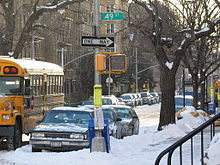
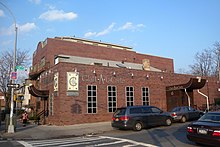
Jewish immigrants began populating Borough Park at the turn of the 20th century, beginning in 1904–1905. By 1914, a YMHA had formed and purchased a lot on 58th Street and 14th Avenue on which to build a large facility. Through the 1930s, 13th Avenue was lined with pushcart vendors and pickle sellers. In the late 1930s, the city opened a public market on 42nd Street to force an end to the pushcart trade.
During the late 1920s and early 1930s, many Yemenite Jews emigrated from both Yemen and Palestine, creating their own small enclave in Borough Park. They established their own synagogue and named it Ohel Shalom. The synagogue moved from a small storefront building to 12th Avenue and 44th street when they purchased an old church.
In the 1980s, the neighborhood changed demographically — from one of Italian, Irish, and Modern Orthodox Jewish to Hasidic Jewish families. By 1983, an estimated 85 percent of the residents of Borough Park were Jewish. New shops and restaurants opened on 13th Avenue to serve the expanding Orthodox Jewish community. In 1987, two of the most popular stores debuted: Eichler's Judaica bookstore, and Kosher Castle Dairy Cafeteria. New stores also opened, selling imported goods and computer technology. At the end of the 1990s, businesses began selling electronics and Jewish books, music, and videos to overseas customers via the Internet. The area continued developing into a very large Jewish enclave around that time period.
"Baby Boom Capital" nickname
In the 2000 United States Census, it was reported that an estimated 76,600 Jews lived in Borough Park. Since that time, Borough Park has grown significantly, and was given the title of "baby boom capital" of New York City by the New York Post because of the high birth rate. The population in 2011 was 140,000. The neighborhood recorded 4,523 births in 2004, the highest in the city. The closest Brooklyn neighborhood in terms of population growth was Williamsburg, home to many Satmar Hasidim, which reported 3,839 births. Borough Park's birth rate, 24.4 per 1,000 residents, has translated into growth in the neighborhood.
Many of these births occur at Maimonides Medical Center, a hospital in the Borough Park area. The Maimonides Infants & Children's Hospital of Brooklyn is fully accredited as a "children's hospital within a hospital", one of three such facilities in New York City. Here, at The Stella and Joseph Payson Birthing Center, Maimonides handles more births than any other hospital in New York State.
The size of many Hasidic families often requires larger homes, and this has fueled construction and renovation projects across the neighborhood. The majority of these projects involve larger bedrooms and kitchens. A 1998 article in The New York Times stated that, "Since 1990, the Building Department has issued more permits for private construction projects — new homes and additions — in the Borough Park area than in any other residential neighborhood in Brooklyn." These construction projects were aided with a new law passed in 1992, which established Borough Park as a special zoning district where residents could build on 65% of their lot, thus reducing the size of setbacks and backyards.
Business development

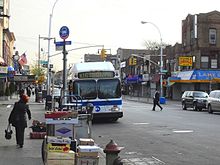
Thirteenth Avenue, a commercial strip roughly one mile in length from 39th to 55th Streets, features storefronts supplying Jewish households. Many Hasidic Jews shop at these stores, coming from all parts of the city, other states, and even other countries to buy kosher items. Businesses have benefited from the growing Jewish population, the increasing density of the neighborhood, and the use of the Internet.
The community receives many visitors, especially among Israeli expatriates and tourists. The Park House Hotel between 12th and 13th Avenues on 48th Street, the first kosher hotel in Borough Park, was established in 1987. In 1999, a kosher hotel called "The Avenue Plaza Hotel" opened on 13th Avenue, becoming the first new hotel to appear in the neighborhood in more than a decade. These hotels along with many area merchants specifically accommodate the needs of visiting Hasidic tourists.
Demographics
Based on data from the 2010 United States census, the population of Borough Park was 106,357, an increase of 5,302 (5.2%) from the 101,055 counted in 2000. Covering an area of 1,238.87 acres (501.35 ha), the neighborhood had a population density of 85.9 inhabitants per acre (55,000/sq mi; 21,200/km).
The racial make-up of the neighborhood was 77.0% (81,910) White, 0.7% (794) African American, 0.1% (60) Native American, 11.7% (12,464) Asian, 0.0% (8) Pacific Islander, 0.2% (236) from other races, and 0.8% (894) from two or more races. Hispanic or Latino of any race were 9.4% (9,991) of the population.
The entirety of Community District 12, which includes Borough Park, Kensington, and Ocean Parkway, had 201,640 inhabitants as of NYC Health's 2018 Community Health Profile, with an average life expectancy of 84.2 years. This is higher than the median life expectancy of 81.2 for all New York City neighborhoods. Most inhabitants are middle-aged adults and youth: 34% are between the ages of 0–17, 28% between 25–44, and 18% between 45–64. The ratio of college-aged and elderly residents was lower, at 9% and 10%, respectively.
As of 2016, the median household income in Community District 12 was $45,364. In 2018, an estimated 28% of Community District 12 residents lived in poverty, compared to 21% in all of Brooklyn and 20% in all of New York City. Less than one in fifteen residents (6%) were unemployed, compared to 9% in the rest of both Brooklyn and New York City. Rent burden, or the percentage of residents who have difficulty paying their rent, is 64% in Community District 12, higher than the citywide and boroughwide rates of 52% and 51%, respectively. Based on this calculation, as of 2018, Community District 12 is considered to be high-income, relative to the rest of the city.
According to the 2020 census data from New York City Department of City Planning, there were 40,000+ White residents, and each the Hispanic and Asian populations were between 5,000 to 9,999 residents. Meanwhile, the Black residents were less than 5,000.
Climate
Borough Park falls under different climate types depending on the climate classification system used. However, the Köppen climate classification system is the most widely used climate classification scheme.
| Climatic scheme | Initials | Description |
|---|---|---|
| Köppen system | Cfa | humid subtropical climate |
| Trewartha system | Do | Temperate oceanic climate |
| Alisov system | — | Temperate climate |
| Strahler system | — | Moist continental climate |
| Thornthwaite system | C2 B'1 | Moist subhumid |
| Neef system | — | Temperate climate |
| Borough Park | ||||||||||||||||||||||||||||||||||||||||||||||||||||||||||||
|---|---|---|---|---|---|---|---|---|---|---|---|---|---|---|---|---|---|---|---|---|---|---|---|---|---|---|---|---|---|---|---|---|---|---|---|---|---|---|---|---|---|---|---|---|---|---|---|---|---|---|---|---|---|---|---|---|---|---|---|---|
| Climate chart (explanation) | ||||||||||||||||||||||||||||||||||||||||||||||||||||||||||||
| ||||||||||||||||||||||||||||||||||||||||||||||||||||||||||||
| ||||||||||||||||||||||||||||||||||||||||||||||||||||||||||||
| Climate data for Borough Park, 2005–2022 normals | |||||||||||||
|---|---|---|---|---|---|---|---|---|---|---|---|---|---|
| Month | Jan | Feb | Mar | Apr | May | Jun | Jul | Aug | Sep | Oct | Nov | Dec | Year |
| Record high °F (°C) | 72 (22) |
73 (23) |
82 (28) |
92 (33) |
94 (34) |
97 (36) |
104 (40) |
101 (38) |
97 (36) |
92 (33) |
80 (27) |
72 (22) |
104 (40) |
| Mean maximum °F (°C) | 60.6 (15.9) |
59.7 (15.4) |
71.4 (21.9) |
83.5 (28.6) |
88.5 (31.4) |
92.1 (33.4) |
96.6 (35.9) |
94.3 (34.6) |
90.5 (32.5) |
79.7 (26.5) |
70.9 (21.6) |
62.8 (17.1) |
97.8 (36.6) |
| Mean daily maximum °F (°C) | 40.1 (4.5) |
41.9 (5.5) |
50.5 (10.3) |
62.1 (16.7) |
72.0 (22.2) |
80.1 (26.7) |
85.8 (29.9) |
84.2 (29.0) |
77.2 (25.1) |
64.9 (18.3) |
54.3 (12.4) |
44.8 (7.1) |
63.2 (17.3) |
| Daily mean °F (°C) | 33.9 (1.1) |
35.3 (1.8) |
43.2 (6.2) |
53.7 (12.1) |
63.5 (17.5) |
72.1 (22.3) |
78.2 (25.7) |
76.6 (24.8) |
69.9 (21.1) |
58.3 (14.6) |
48.0 (8.9) |
39.3 (4.1) |
56.0 (13.4) |
| Mean daily minimum °F (°C) | 27.7 (−2.4) |
28.8 (−1.8) |
35.8 (2.1) |
45.3 (7.4) |
55.0 (12.8) |
64.2 (17.9) |
70.5 (21.4) |
69.1 (20.6) |
62.6 (17.0) |
51.6 (10.9) |
41.5 (5.3) |
33.8 (1.0) |
48.8 (9.4) |
| Mean minimum °F (°C) | 10.0 (−12.2) |
12.7 (−10.7) |
20.1 (−6.6) |
34.2 (1.2) |
44.1 (6.7) |
53.4 (11.9) |
62.6 (17.0) |
61.2 (16.2) |
51.4 (10.8) |
38.7 (3.7) |
28.4 (−2.0) |
19.2 (−7.1) |
7.8 (−13.4) |
| Record low °F (°C) | 3 (−16) |
−1 (−18) |
11 (−12) |
26 (−3) |
33 (1) |
50 (10) |
57 (14) |
56 (13) |
47 (8) |
32 (0) |
17 (−8) |
7 (−14) |
−1 (−18) |
| Average precipitation inches (mm) | 3.53 (90) |
3.60 (91) |
3.95 (100) |
4.54 (115) |
4.25 (108) |
4.74 (120) |
5.06 (129) |
5.16 (131) |
3.87 (98) |
5.67 (144) |
3.72 (94) |
4.63 (118) |
52.72 (1,338) |
| Average rainfall inches (mm) | 2.55 (65) |
2.44 (62) |
3.50 (89) |
4.51 (115) |
4.25 (108) |
4.74 (120) |
5.06 (129) |
5.16 (131) |
3.87 (98) |
5.65 (144) |
3.66 (93) |
4.16 (106) |
49.55 (1,260) |
| Average snowfall inches (cm) | 9.8 (25) |
11.6 (29) |
4.5 (11) |
0.3 (0.76) |
0.0 (0.0) |
0.0 (0.0) |
0.0 (0.0) |
0.0 (0.0) |
0.0 (0.0) |
0.2 (0.51) |
0.6 (1.5) |
4.7 (12) |
31.7 (79.77) |
| Average precipitation days | 10.7 | 10.6 | 10.3 | 11.3 | 12.1 | 11.9 | 10.4 | 9.8 | 7.7 | 10.4 | 9.5 | 11.6 | 126.3 |
| Average rainy days | 7.1 | 7.1 | 8.5 | 11.1 | 12.1 | 11.9 | 10.4 | 9.8 | 7.7 | 10.3 | 9.2 | 9.5 | 114.7 |
| Average snowy days | 3.6 | 3.5 | 1.8 | 0.2 | 0.0 | 0.0 | 0.0 | 0.0 | 0.0 | 0.1 | 0.3 | 2.1 | 11.6 |
| Graphs are unavailable due to technical issues. Updates on reimplementing the Graph extension, which will be known as the Chart extension, can be found on Phabricator and on MediaWiki.org. |
See or edit raw graph data.
Police and crime
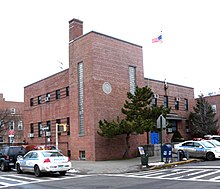
The NYPD's 66th Precinct is located at 5822 16th Avenue. The 66th Precinct ranked 3rd safest out of 69 patrol areas for per-capita crime in 2010. As of 2018, with a non-fatal assault rate of 19 per 100,000 people, Borough Park's rate of violent crimes per capita is less than that of the city as a whole. The incarceration rate of 155 per 100,000 people is lower than that of the city as a whole.
The 66th Precinct has a lower crime rate than in the 1990s, with crimes across all categories having decreased by 87.7% between 1990 and 2018. The precinct reported 0 murders, 20 rapes, 101 robberies, 141 felony assaults, 186 burglaries, 447 grand larcenies, and 79 grand larcenies auto in 2018.
Borough Park also has various volunteer neighborhood patrols that are mostly made up of members of the Hasidic community. Hatzolah is a volunteer ambulance group composed of emergency medical technicians and paramedics. City Wide Safety Patrol Shmira and Brooklyn South Safety Patrol Shomrim are both citizens watch patrol groups that are sanctioned by the New York City Police Department (NYPD) community affairs division. They respond to security-related calls in the area, and are called upon by the NYPD to assist in searches for missing persons.
Fire safety
The New York City Fire Department (FDNY) operates two firehouses in the area. Engine Company 282/Ladder Company 148 is located at 4210 12th Avenue. Engine Company 247 is located at 1336 60th Street.
Health
As of 2018, preterm births and births to teenage mothers are less common in Community District 12 than in other places citywide. In Community District 12, there were 60 preterm births per 1,000 live births (compared to 87 per 1,000 citywide), and 18.1 births to teenage mothers per 1,000 live births (compared to 19.3 per 1,000 citywide). Community District 12 has a high population of residents who are uninsured, or who receive healthcare through Medicaid. In 2018, this population was estimated to be 15%, which is higher than the citywide rate of 12%.
The concentration of fine particulate matter, the deadliest type of air pollutant, in Community District 12 is 0.0075 milligrams per cubic metre (7.5×10 oz/cu ft), lower than the citywide and boroughwide averages. Ten percent of Community District 12 residents are smokers, which is lower the city average of 14% of residents being smokers. In Community District 12, 15% of residents are obese, 9% are diabetic, and 27% have high blood pressure—compared to the citywide averages of 24%, 11%, and 28% respectively. In addition, 17% of children are obese, compared to the citywide average of 20%.
Ninety-two percent of residents eat some fruits and vegetables every day, which is higher than the city's average of 87%. In 2018, 78% of residents described their health as "good", "very good", or "excellent", equal to the city's average of 78%. For every supermarket in Community District 12, there are 20 bodegas.
Maimonides Medical Center has 679 beds, a full ER with a level 2 trauma center, maternity wards, and psychiatric services. It includes a large outpatient clinics program, and is a major teaching hospital in the state of New York.
Post offices and ZIP Codes
Borough Park is covered by ZIP Codes 11204, 11218, 11219, and 11230. 11219 is the primary ZIP Code for Borough Park. The United States Post Office operates the Blythebourne Station at 1200 51st Street.
Religion

Borough Park is home to many Hasidic groups, the largest being the Bobov sect (including Bobov-45). The Boyan, Belz, Ger, Satmar, Karlin-Stolin, Vizhnitz, Munkacz, Spinka, Klausenburg, Skver, and Puppa communities also reside here, among others. There is a minority of Haredi non-Hasidic Lithuanian Jews (typically called Litvish or Yeshivish) and Sephardic Jews, with a smaller number of Modern Orthodox Jews.
In Brooklyn, about 37% of Jews consider themselves Orthodox, and Borough Park is often referred to as the "heartland" or "home" for New York's Orthodox Jewish population. The neighborhood became largely Orthodox since the 1970s, making a transformation sometimes referred to as "suburb to shtetl".
During much of the early 1900s, the Jewish population in Borough Park, and Brooklyn as a whole, was part of a much more liberal-leaning voting block. However, many of these early Jewish families moved to the suburbs or other places around the city, while more conservative Hasidic Jews (many of them survivors of the Holocaust and immigrant families from Eastern Europe) joined their neighborhoods. As a result, the overwhelming majority of the Hasidic population in Borough Park and Brooklyn introduced a more traditional Jewish religious lifestyle. A 2002 study by the UJA Federation-New York revealed that only 2% of Borough Park's Jews identified themselves as Reform Jews, and nearly three-fourths identified themselves as Orthodox Jews.
Religious observances
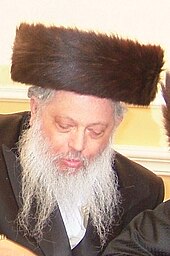
The Orthodox Jewish population adheres strongly to halakha (Jewish law) and the Shulkhan Arukh (halakhic code), following religious laws in their daily lives. Saturday is the Shabbos (Ashkenazi pronunciation of Hebrew Shabbat, Jewish Sabbath), a day of rest, which is strictly observed by Orthodox members of the Jewish community. In some areas, a siren is sounded on Friday before sundown, to indicate the arrival of the Shabbos. Culturally and religiously, the Jewish population of the neighborhood is considered one of the most Orthodox in the world, as "any families do not own televisions or attend movies. The children attend yeshivas, instead of public schools. Adolescent girls do not leave the house without making certain that their knees and elbows are covered, and at weddings and funerals alike, women and men sit separately, to avoid physical contact, as required by religious law." Additionally, stores in Borough Park sell or prepare only kosher food made under rabbinical supervision. There was a large controversy surrounding the erection of an eruv in Borough Park, because of differing interpretations of the application of Jewish law. An eruv was built in 1999–2000, and encompasses about 225 blocks in Borough Park. Its use is still the subject of controversy.
Mikvahs (Jewish ritual baths) are scattered across the neighborhood, as it is considered a vital part of Orthodox Jewish life. It is rather difficult to identify, as it is not usually explicitly advertised, to promote privacy among its users.
Bobov
Main article: Bobov (Hasidic dynasty)Borough Park is home to the headquarters of Hasidic Judaism's large Bobov community (including Bobov-45) numbering an estimated several thousand families. It is one of Brooklyn's largest Hasidic communities, and also has followers in Canada, England, Belgium, and Israel.
Satmar
Main article: Satmar (Hasidic dynasty)Satmar is one of the largest Hasidic groups in Brooklyn. It is characterized by extreme religious rigidity, complete rejection of modern culture, and fierce anti-Zionism. Satmar sponsors a comprehensive education system. It has two large boys' schools in Borough Park: one on 53rd Street, between 13th and 14th Avenues; and the other at 54th Street and Fort Hamilton Parkway. Their largest girls school, Bais Ruchel, is on 14th Avenue, between 53rd and 54th Street; the building served as a New York City public school until its purchase in 1979 by United Talmudical Academy, Satmar's educational arm.
Education
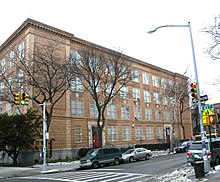
Borough Park generally has a lower ratio of college-educated residents than the rest of the city as of 2018. While 32% of residents age 25 and older have a college education or higher, 23% have less than a high school education and 45% are high school graduates or have some college education. By contrast, 40% of Brooklynites and 38% of city residents have a college education or higher. The percentage of Borough Park students excelling in reading and math has been increasing, with reading achievement rising from 50 percent in 2000 to 53 percent in 2011, and math achievement rising from 46 percent to 70 percent within the same time period.
Borough Park's rate of elementary school student absenteeism is lower than the rest of New York City. In Borough Park, 11% of elementary school students missed twenty or more days per school year, compared to the citywide average of 20% of students. Additionally, 77% of high school students in Borough Park graduate on time, higher than the citywide average of 75% of students.
Schools
The New York City Department of Education operates the public schools in the neighborhood, which comprises District 20. PS/IS 180 Homewood School, a zoned public K-8 school, receives many bused-in students from other neighborhoods, including Bay Ridge and Bensonhurst. Many elementary schools have had mixed results from this student drain; for example, in 2004, a New York Times reporter stated that PS 164 was "at only 89 percent of capacity because many children in the community attend yeshivas (Jewish private schools). Classes are small, the hallways quiet, the principal and assistant principal know every student by name." Subsequently, the percentage of children reading at or above the grade level has increased to 55% in 2004 from 40% in 1998 in an otherwise unchanged school.
Most Boro Park parents send children to yeshivas. In fact, virtually all the large population of school-children born into the neighborhood's Hasidic families attend local yeshivas for boys and Bais Yaakov-type schools for girls. This had diminished the student population of local schools, such as The Montauk Intermediate School. The New York City Department of Education hoped to take advantage of the empty space and construct a small school, called the Kingsborough Early College School, inside Montauk. The Hasidic community was not pleased by the prospect of a new public school because it would bring "a bad element" (a supposed euphemism for immodestly attired girls), and protested the decision. The Community Educational Council heard these complaints and decided against expanding its public school system. Instead, an all-girls 6–12 school, the Urban Assembly for School for Criminal Justice moved in, and occupies part of the 3rd floor and the entire 4th floor of the building with its over 500 girls. In addition, The Montauk School now serves mostly Asian students; and nearly a third of its nearly 1000 students are English as a New Language students. Together, the schools service nearly 1600 students, above the target capacity of 1422 students.
Library
The Brooklyn Public Library (BPL)'s Borough Park branch is located at 1265 43rd Street near 13th Avenue.
Transportation
The B8, B9, B11, B16 and B35 New York City Bus routes serve the area, as well as the private B110 bus route to the predominantly Jewish neighborhood of Williamsburg. The New York City Subway's BMT West End Line, serving the D train, is at 55th Street, 50th Street, and Fort Hamilton Parkway. The IND Culver Line, serving the F and <F> trains, runs along McDonald Avenue, the eastern border of Borough Park. The BMT Sea Beach Line on the N and W services also serves the neighborhood at Fort Hamilton Parkway.
Borough Park's major avenues run from north to south, and its major shopping districts are on 13th, 16th, and 18th Avenues.
Notable people
See also: Category:People from Borough Park, Brooklyn
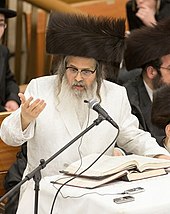
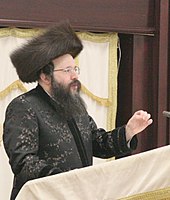
- Chaim Zanvl Abramowitz (1902–1995), rebbe of Rybnitsa
- Helène Aylon (1931–2020), multi-media eco-feminist artist.
- Paul Bateson (born 1940) Radiological technician who, a few years after playing one in The Exorcist, at which time he lived in Borough Park, was convicted of murdering a film critic; he is also suspected in a series of unsolved serial killings of gay men in the late 1970s.
- Richard J. Bernstein (born 1932), philosopher, Vera List Professor of Philosophy, and former dean of the graduate faculty at The New School.
- Jay Black (born 1938), singer.
- Yaakov Bleich (born 1964), widely recognized as Chief Rabbi of Kyiv and all of Ukraine
- Gidone Busch (1968–1999), police-shooting victim
- Menachem Daum (born c. 1947), Holocaust survivor and documentary film-maker
- Alan Dershowitz (born 1938), law professor, litigator, and author
- Simcha Eichenstein, New York state assemblyman
- Simcha Felder, New York state senator
- Norman Finkelstein (born 1953), political scientist and pro-Palestine activist.
- Joseph Flom (1923–2011), mergers and acquisitions lawyer
- Linda Weiser Friedman (born 1953), professor and author
- David Geffen (born 1943), business magnate, producer, and philanthropist.
- Eli Gerstner (born 1980), singer, songwriter, and producer
- Leon M. Goldstein (died 1999), President of Kingsborough Community College, and acting Chancellor of the City University of New York
- Buddy Hackett, comedian and actor
- Shraga Feivish Hager, also known as the Kosover Rebbe; rebbe of the Kosov Hasidic dynasty, dayan ("rabbinic judge"), and orator
- Ben Zion Aryeh Leibish Halberstam, the fifth and current rebbe of Bobov
- Naftali Halberstam, fourth rebbe of Bobov
- Shlomo Halberstam, third rebbe of Bobov
- Shmuel Dovid Halberstam, the Sanz-Klausenberger Rebbe of Borough Park; younger son and one of the successors of Rabbi Yekusiel Yehudah Halberstam, the previous Klausenberger Rebbe
- Yitzchak Meir Helfgot, cantor
- Henry Hoschander, rabbi and lecturer
- Ahmed Ibrahim, the Cupid Cabbie of New York.
- Menashe Klein, rabbi of Ungvar
- Yossi Klein Halevi, author
- Leiby Kletzky, 8-year-old Hasidic boy kidnapped, murdered, and dismembered by Levi Aron in July 2011
- Aharon Kotler, rabbi and prominent leader of Haredi Judaism
- Sandy Koufax (born 1935), Hall of Fame major league baseball pitcher.
- Moshe Koussevitzky, cantor and vocalist
- Shulem Lemmer (born 1990), singer and entertainer
- Chris Paciello, Cosa Nostra associate and nightclub owner
- Yaakov Perlow, rebbe of Novominsk
- Yisroel Avrohom Portugal, rebbe of Skulen
- Moshe Leib Rabinovich, rebbe of Munkacs
- Lou Reed, singer, songwriter, musician
- Yossele Rosenblatt, cantor and composer
- Yechezkel Roth, rabbi
- John Saxon (1936–2020), film actor
- Arnold Schuster, clothing salesman and amateur detective, involved in the capture of bank robber Willie "The Actor" Sutton, and for subsequently being the victim of a gangland murder by the Gambino crime family
- Moyshe Silk, Acting Assistant Secretary of Treasury for International Affairs
- Eliyahu Simpson, rabbi of the Nusach Ari Tzemach Tzedek Synagogue
- Aaron Teitelbaum, rebbe of Satmar
- Moshe Teitelbaum, rebbe of Satmar
- Zalman Teitelbaum, rebbe of Satmar
- Mordechai Dovid Unger, rebbe of Bobov 45
- Osher Weiss, rabbi
- Mendy Werdyger, singer and songwriter
- David Werner (born c. 1953), real estate investor.
- Gavriel Zinner, rabbi and author of Nitei Gavriel
- Meir Zlotowitz, president of ArtScroll/Mesorah Publications
Notes
- His grandson, Electus D. Litchfield, continued as an architect and real estate developer.
- Mid-latitude temperate maritime climate
References
- ^ "NYC Planning | Community Profiles". communityprofiles.planning.nyc.gov. New York City Department of City Planning. Retrieved March 18, 2019.
- "Census data Archived March 3, 2021, at the Wayback Machine". Greenpoint Languages Spoken
- ^ Table PL-P5 NTA: Total Population and Persons Per Acre – New York City Neighborhood Tabulation Areas*, 2010 Archived June 10, 2016, at the Wayback Machine, Population Division – New York City Department of City Planning, February 2012. Accessed June 16, 2016.
- ^ Table PL-P3A NTA: Total Population by Mutually Exclusive Race and Hispanic Origin – New York City Neighborhood Tabulation Areas*, 2010 Archived June 10, 2016, at the Wayback Machine, Population Division – New York City Department of City Planning, March 29, 2011. Accessed June 14, 2016.
- "Borough Park neighborhood in New York". Retrieved August 21, 2015.
- ^ Barnes, Julian E. (June 2, 2000). "Symbolic Line Divides Jews In Borough Park; A Debate Over Strictures For Sabbath". The New York Times. ISSN 0362-4331. Retrieved March 15, 2021.
- "Transcript: Mayor de Blasio Attends the Boro Park Jewish Community Council's Ribbon Cutting". NYC.gov. September 25, 2019.
- Samuel C. Heilman (April 9, 2009). "The Young and the Restless". The New York Times.
as the locals spell it, Boro Park
- Schick, Marvin. "A Census of Jewish Day Schools in The United States." Archived December 9, 2020, at the Wayback Machine
- ^ "NYPD – 66th Precinct". www.nyc.gov. Retrieved October 3, 2016.
- Current City Council Districts for Kings County Archived January 31, 2017, at the Wayback Machine, New York City. Accessed May 5, 2017.
- Oscar Israelowitz, Borough Park, Centennial Edition 1898–1998, (Israelowitz Publishing)
- Jackson, Kenneth T.; Manbeck, John B., eds. (2004). The Neighborhoods of Brooklyn (2nd ed.). New Haven, Connecticut: Citizens for NYC and Yale University Press. ISBN 0-300-10310-7.
- ^ Walsh, Kevin (October 24, 2011). "BOROUGH PARK – Forgotten New York".
- "Map and Photos of Borough Park". Archived from the original on October 24, 2014. Retrieved October 23, 2014.
- ^ Roane, Kit R. (August 22, 1999). "For Jews Around World, Borough Park Is the Place to Shop". The New York Times. ISSN 0362-4331. Retrieved August 2, 2020.
- "The Real Estate Field; Broadway and Fifty-sixth Street Corner Leased to Studebaker Corporation". The New York Times. October 31, 1914. ISSN 0362-4331. Retrieved August 2, 2020.
- Drattell, Alan (2010). Once Upon My Time...: The Life of Alan Drattell: A Memoir. Xlibris Corporation. p. 26. ISBN 978-1450084635.
- ^ Sontag, Deborah (January 7, 1998). "Orthodox Neighborhood Reshapes Itself". The New York Times. ISSN 0362-4331. Retrieved August 2, 2020.
- "Borough Park, NY – Yemenites Jewish, Yet Different" Archived August 31, 2021, at the Wayback Machine, VINnews.com, May 15, 2008. Accessed August 31, 2021. "In 1949 Congregation Ohel Shalom purchased a clapboard Christian Science church in Borough Park. This building is the congregation's home to this day. Yemenite Jewry is among the first branches of Judaism to choose Borough Park as its spiritual capital."
- ^ Mintz, Jerome (1992). Hasidic People: A Place in the New World. Harvard University Press. ISBN 0674381157.
- "In the Land of Black Coats". The New York Times. April 20, 2008. Retrieved October 2, 2015.
- Campanile, Carl (January 23, 2006). "Fertile Grounds – Baby Boom in Borough Park". New York Post. Retrieved October 2, 2015.
- "Maimonides". maimo.org/.
- Hartocollis, Anemona; Fessenden, Ford (June 25, 2010). "Manhattan Birth Certificate, Brooklyn Address". The New York Times. ISSN 0362-4331. Retrieved August 2, 2020.
- Baum, Josh. "Borough Park, New York Area Hotels". USA Today. Retrieved December 24, 2012.
- ^ "Borough Park (Including Borough Park, Kensington and Ocean Parkway)" (PDF). nyc.gov. NYC Health. 2018. Retrieved March 2, 2019.
- ^ "2016–2018 Community Health Assessment and Community Health Improvement Plan: Take Care New York 2020" (PDF). nyc.gov. New York City Department of Health and Mental Hygiene. 2016. Retrieved September 8, 2017.
- Short, Aaron (June 4, 2017). "New Yorkers are living longer, happier and healthier lives". New York Post. Retrieved March 1, 2019.
- "Census profile: NYC-Brooklyn Community District 12—Borough Park, Kensington & Ocean Parkway PUMA, NY". Census Reporter. July 22, 2018. Retrieved July 22, 2018.
- "Key Population & Housing Characteristics; 2020 Census Results for New York City" (PDF). New York City Department of City Planning. August 2021. pp. 21, 25, 29, 33. Retrieved November 7, 2021.
- "Map: Race and ethnicity across the US". CNN. August 14, 2021. Retrieved November 7, 2021.
- "Trewartha maps". kkh.ltrr.arizona.edu. Retrieved June 27, 2020.
- Cmapm, Kliimavöötmed svg: Urmasderivative work (June 16, 2011), Русский: Климатические пояса Земли по Б. П. Алисову., retrieved June 27, 2020
- "World Strahler Climate Map". Retrieved June 27, 2020.
- Feddema, Johannes J. (January 2005). "A Revised Thornthwaite-Type Global Climate Classification". Physical Geography. 26 (6): 442–466. Bibcode:2005PhGeo..26..442F. doi:10.2747/0272-3646.26.6.442. ISSN 0272-3646. S2CID 128745497.
- "Klimaklassifikation". www.spektrum.de (in German). Retrieved June 27, 2020.
- ^ "Borough Park – DNAinfo.com Crime and Safety Report". www.dnainfo.com. Archived from the original on March 6, 2019. Retrieved October 6, 2016.
- "66th Precinct CompStat Report" (PDF). Retrieved July 22, 2018.
- ^ Walzer, Robert (February 14, 1999). "If You're Thinking of Living In / Borough Park, Brooklyn; For Many Orthodox Jews, a Heartland". The New York Times. ISSN 0362-4331. Retrieved August 2, 2020.
- Kilgannon, Corey (September 3, 2010). "In Protecting Hasidic Neighborhoods, Squads Patrol Without Guns or Badges". The New York Times. ISSN 0362-4331. Retrieved August 2, 2020.
- "FDNY Firehouse Listing – Location of Firehouses and companies". NYC Open Data; Socrata. New York City Fire Department. September 10, 2018. Retrieved March 14, 2019.
- "Engine Company 282/Ladder Company 148". FDNYtrucks.com. Retrieved March 2, 2019.
- "Engine Company 247". FDNYtrucks.com. Retrieved March 2, 2019.
- ^ New York City Health Provider Partnership Brooklyn Community Needs Assessment: Final Report Archived July 23, 2018, at the Wayback Machine, New York Academy of Medicine (October 3, 2014).
- "NYC Neighborhood ZIP Code Definitions". New York State Department of Health. November 7, 2014. Archived from the original on March 27, 2019. Retrieved March 5, 2019.
- "USPS Locations". Retrieved June 20, 2018.
- Heilman, Samuel C. (April 9, 2006). "Opinion | The Young and the Restless". The New York Times. ISSN 0362-4331. Retrieved August 2, 2020.
- Hellman, Peter (September 15, 1995). "The Devout Raise a City Within a City And Prosper". The New York Times. ISSN 0362-4331. Retrieved August 2, 2020.
- Newman, Andy (May 13, 2005). "Reform Jews, Adrift in a Sea of Black Hats". The New York Times. ISSN 0362-4331. Retrieved August 2, 2020.
- Confessore, Nicholas; Farmer, Ann (May 10, 2006). "In Borough Park, the Unusual Taste of Fear". The New York Times. ISSN 0362-4331. Retrieved August 2, 2020.
- Newman, Andy (March 26, 2005). "A Battle for Succession Takes No Holiday". The New York Times. ISSN 0362-4331. Retrieved August 2, 2020.
- "Tour of Satmar School Provides Rare Glimpse of Girls' Education". 1998.
- Golan, Ori (July 17, 2018) "Former Satmar Hasidic Jew Now Tours World to Expose Sect's Dark Underbelly" Archived September 27, 2020, at the Wayback Machine, Times of Israel. Retrieved May 4, 2020.
- "Satmar UTA Deed". 1979.
- "Borough Park – BK 12" (PDF). Furman Center for Real Estate and Urban Policy. 2011. Retrieved October 5, 2016.
- "District 20 Archived 2009-04-10 at the Wayback Machine." Insideschools.org. Retrieved on November 15, 2008.
- Purnick, Joyce (April 5, 2004). "Metro Matters; Schools Find New Test, For Themselves". The New York Times. ISSN 0362-4331. Retrieved August 2, 2020.
- "Ps/Is 180 Homewood School Archived 2016-03-09 at the Wayback Machine." Insideschools.org. Retrieved on November 15, 2008.
- Gootman, Elissa. "Plans for a Public School Upset Brooklyn Hasidim." The New York Times. February 3, 2006. p. B3
- NYCDOE, "NYCDOE Blue Book, Capacity and Utilization Report.", Accessed=January 17, 2016
- NYCDOE, "NYCDOE Montauk School Page", Accessed=January 17, 2016
- "Borough Park Library". Brooklyn Public Library. August 17, 2011. Retrieved February 21, 2019.
- "Brooklyn Bus Map" (PDF). Metropolitan Transportation Authority. October 2020. Retrieved December 1, 2020.
- Vox Tablet. "Helène Aylon's Journey From Rebbetzin to Internationally Acclaimed Feminist Artist; The irreverent 82-year-old left Orthodox Borough Park long ago. But she's still wrestling with the rituals of her past." Archived June 3, 2016, at the Wayback Machine, Tablet (magazine), September 9, 2013. Accessed May 9, 2016.
- Bell, Arthur (October 31, 1977). "A Talk on the Wild Side". The Village Voice. Retrieved February 22, 2019.
- Bernstein, Richard J.; Benhabib, Seyla; and Fraser, Nancy. Pragmatism, Critique, Judgment: Essays for Richard J. Bernstein, p. 331. Accessed May 9, 2016. "The youngest of two children, two boys and a girl, he grew up in Borough Park, a primarily lower-middle-class section of Brooklyn."
- Eliot, Marc. Song of Brooklyn: An Oral History of America's Favorite Borough, p. 49. Crown/Archetype, 2008. ISBN 9780767929998. Accessed May 9, 2016. "Jay Black, the leader of the group, was also born and grew up in Brooklyn. Because of the way he looked, with his greased-back hair and his neo-operatic voice, everyone thought he was Italian, which was a good thing, since most of the bands were either black or Italian, but he was actually Orthodox Jewish from Borough Park."
- Staff. "Cops' deadly choices" Archived September 25, 2017, at the Wayback Machine, New York Post, April 19, 2012. Accessed September 24, 2017. "In 1999, cops shot Gidone Busch of Borough Park, after he attacked them with a small hammer during a psychotic episode."
- Margolick, David. "Opening A Window On Hasidism" Archived December 26, 2017, at the Wayback Machine, The New York Times, July 20, 1997. Accessed September 24, 2017. "Mr. Daum, 50, born to Holocaust survivors in Poland, still wears a yarmulke and beard, and lives in Borough Park, a largely Hasidic neighborhood."
- Aviv, Rachel. "The Outcast; After a Hasidic man exposed child abuse in his tight-knit Brooklyn community, he found himself the target of a criminal investigation." Archived September 22, 2017, at the Wayback Machine, The New Yorker, November 10, 2014. Accessed September 24, 2017. "Alan Dershowitz, who grew up in Borough Park, told me that 'the Kellner information put the government in a difficult position: On the one hand, they are proclaiming that my client was extorted, and, on the other hand, they are claiming that he is guilty of eight felonies.'"
- Staff. (May 2, 2018) "Eichenstein Announces Candidacy In Expected Cakewalk" Archived February 24, 2021, at the Wayback Machine, Kings County Politics. "A lifelong resident of Boro Park and well-known member of the community, Eichenstein's candidacy was long anticipated and immediately applauded by community leaders."
- Rivlin-Nadler, Max; and Evans, Lauren. "Meet The Senator Who Stands Between New Yorkers And Universal Health Care" Archived September 25, 2017, at the Wayback Machine, The Village Voice, May 25, 2017. Accessed September 24, 2017. "That one vote is represented by State Senator Simcha Felder, of Borough Park, Brooklyn."
- Harris, Ben. "Beached: The Academic Exile of Norman Finkelstein". NY Mag. New York Magazine. Retrieved December 14, 2023.
- Margolick, David. "At the Bar; Portrait of a scrappy lawyer leaves the subject unflattered, and trying to remove some warts." Archived January 17, 2018, at the Wayback Machine, The New York Times, December 10, 1993. Accessed September 24, 2017. "According to Mr. Caplan, Mr. Flom's scrappy iconoclasm originated in the Borough Park and Flatbush sections of Brooklyn, where his garment worker parents flirted with poverty and even suicide, and he was undomesticated by either Townsend Harris High School or Harvard Law School."
- Handelman, David. "How David Geffen Got Ahead: Lies, Loot and a Little Luck" Archived August 6, 2016, at the Wayback Machine, The New York Observer, March 13, 2000. Accessed May 15, 2016. "David Geffen grew up in Borough Park, Brooklyn, the son of a mother who made custom brassieres and a father who didn't do much of anything."
- LARRY YUDELSON (May 31, 2018). "Writing the Jewish story in Jerusalem". Jewishstandard.timesofisrael.com. Retrieved February 16, 2022.
This was when Yossi, who lived in Borough Park, Brooklyn, was in sixth grade.
- Baker, Al; Robbins, Liz; Goldstein, Joseph (July 13, 2011). "Missing Boy's Dismembered Body Found; Suspect Says He Panicked". The New York Times. Retrieved July 13, 2011.
- Bush, Daniel. "There's more to Jewish baseball than Sandy Koufax" Archived April 7, 2016, at the Wayback Machine, The Brooklyn Paper, May 4, 2012. Accessed May 15, 2016. "Ephross said he didn't try to contact Dodgers legend and Borough Park native Sandy Koufax, but promised the book packs some series heat despite leaving out the notoriously reclusive Hall of Fame flamethrower."
- Mikle, Jean. "Meet the Orthodox Jewish Trailblazer From Toms River with a Major Record Deal". Asbury Park Press. Retrieved April 20, 2020.
- DeCurtis, Anthony (2018). "Lou Reed: Una Vida" (PDF). static0planetadelibroscom.cdnstatics.com. Archived from the original (PDF) on November 17, 2020. Retrieved August 2, 2024.
- Treiber, Menachem (June 20, 2018). "ALONG THE SILK ROAD". Mishpacha. Retrieved October 29, 2019.
- Silk, Moyshe (Mitchell) (May 24, 2018). "A U.S. Treasury Official's Moving Encounter With Atlanta Yeshivah Students – A small group makes a big impression in Washington, D.C. – Chabad-Lubavitch News". Mishpacha. Retrieved October 29, 2019.
- "President Donald J. Trump Announces Intent to Nominate Personnel to Key Administration Posts". whitehouse.gov. September 10, 2019. Retrieved September 18, 2019 – via National Archives.
- "Rabbi Eliyahu Simpson (Yaichel)". kevarim.com. March 24, 2017. Retrieved February 2, 2022.
- Levitt, David M. "T-Shirt-Toting Brooklynite Is NYC's Top Property Buyer" Archived December 25, 2019, at the Wayback Machine, Bloomberg News, November 21, 2014. Accessed September 11, 2019. "Werner, who grew up in Manhattan's Washington Heights section and is the son of Holocaust survivors, settled in Borough Park after he got married in his early 20s."
- Gantz, Nesanel (September 15, 2013). "Lunch Break with Rabbi Meir Zlotowitz". Ami. No. 136. p. 90.
